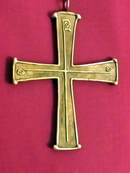 The 2022 Convention of the Diocese of Fond du Lac adopted Resolution 2022-03 regarding the church’s teaching on abortion. Bishop Matt is posting a series of teachings on the subject for study, comments, and questions. In Part 7, Bishop Matt goes “Back to the Bible” to examine and reflect on what scripture says about abortion and discusses ideas by Christian thinkers such as Gregory of Nyssa and Hildegard of Bingen. To read the teaching click here or visit An Odd Work of Grace, a bishop’s blog. 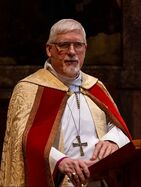 The 2022 Convention of the Diocese of Fond du Lac adopted Resolution 2022-03 regarding the church’s teaching on abortion. Bishop Matt is posting a series of teachings on the subject for study, comments, and questions. After a short pause in the teachings, the lesson on “Tradition” continues, you can read it by clicking here or by visiting his blog at An Odd Work of Grace. 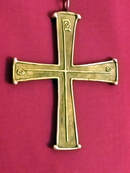 Bishop Matt’s next installment in a series of teachings on abortion is now available for study, comments, and questions. Please visit An Odd Work of Grace or click here to continue to part 5: Tradition. 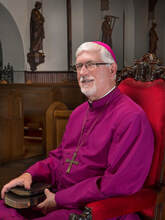 Part 4- Scripture-New Testament is now available from Bishop Matt’s Teaching on Abortion series. “As we saw in the last post, there is little if anything in the Old Testament that directly addresses abortion. There is even less in the New Testament. Jesus says nothing about it. Paul writes nothing about it[1]. This is curious because abortion was not at all unheard of 2,000 years ago.” Click here to continue or visit the bishop's blog, An Odd Work of Grace for the whole series. 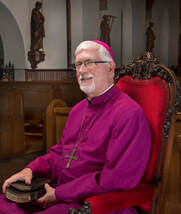 The 2022 Convention of the Diocese of Fond du Lac adopted Resolution 2022-03 regarding the church’s teaching on abortion. RESOLVED, that the 148th Convention of the Diocese of Fond du Lac request the Bishop Diocesan, our Chief Teacher as expressed in the consecration service of the Book of Common Prayer, to provide a series of teachings and theological reflections on the issue of abortion to the members of this diocese over the next six months, and be it further; Resolved, that such series include consideration of Episcopal Church General Convention resolutions addressing the issue as they recognize the theological, moral, legal, personal and societal complexity involved, and be it further; Resolved, that such series provide an avenue for members of this diocese to respond, either publicly or privately, and be it further; Resolved, that through the Advance Reports to the 149th Diocesan Convention, the Bishop Diocesan provide a summary of the series including what was heard from those who may have responded. Bishop Matt is posting a series of teachings on the subject, beginning with resolutions passed by the General Convention of The Episcopal Church over several decades. The series is being posted over the next weeks on the bishop’s blog, ‘An Odd Work of Grace’, for study, comments, or questions. Visit anoddworkofgrace.blogspot or click here Dear Friends, From time immemorial people have gathered around campfires, fireplaces, and stoves for warmth and light. And the fire has been the center of community, whether of family, friends, or strangers crossing paths on the way. Before central heating, the hearth was the heart of any home. 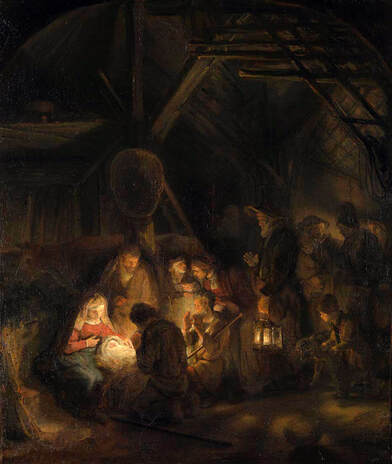 Rembrandt: Adoration of the Shepherds, 1646 Rembrandt: Adoration of the Shepherds, 1646 One of my favorite paintings of the Nativity is ‘The Adoration of the Shepherds’ long attributed to Rembrandt, but now thought to be by one of his students. In the painting, Jesus, lying in the manger, glows with warmth and light. Mary and Joseph are illuminated as they kneel near the holy Baby. Shepherds and others are gathered around Jesus as if drawing near to a fire to escape the gloomy cold of night. Whether or not Jesus actually glowed with light and warmth, the painting points to the understanding that Jesus is the light of the Truth and the warmth of the Love at the heart of everything. He is the fire in the equation of reality enfleshed to reveal the truth of who we are and who we are meant to be as beings created in the image of God. He embodied the love that is lived within the Holy Trinity from eternity. On Christmas, the manger became the hearth of the world bearing the light and love of God into this cold and gloomy world. There is goodness and beauty in the world for sure. And in each of us. But there is also the gloom of ignorance, dishonesty, prejudice, and greed. There is the coldness of selfishness, division, meanness, and violence. Increasingly, we are disconnected, isolated, anxious, fearful, and lonely. At Christmas we are reminded that One has come to invite us to gather together out of the gloomy cold and draw near the Fire that he is to be enlightened and warmed by his truth and love. In the coming year, may our congregations glow with the light and love of Jesus. May each member bear that light and love into the anxious, lonely, divided world around us. May we better see others in the light of God’s love. May we especially bear that love to those who the world pushes into the shadows. Maybe part of our vocation as disciples of Jesus in these times is to be connectors – to remind ourselves and others of the truth that we belong to one another and to engage with others regardless of affinity or agreement. By doing so, we can take the light and warmth we have experienced from the Hearth to the hearts of those we encounter. Merry Christmas, Bishop Matt The Bishop’s Cross is intended to honor those who have provided outstanding service to the Episcopal Church, especially on the diocesan and congregational levels. Established in 1997 as a diocesan award, it is presented at the Convention of the Diocese of Fond du Lac. Bishop Matt Gunter was pleased to award two Bishop's Crosses at the 2022 convention. The first was awarded to Marianne Chaudoir, a member of Trinity Episcopal Church, Oshkosh. The second was awarded to Fr. Ralph Osborne, Rector of St. Thomas, Menasha. Marianne Chaudoir recently retired as Organist of Trinity Episcopal Church, Oshkosh after serving 38 years. She volunteered in several capacities at Trinity and served as diocesan ERD Coordinator. She was the organist at the Bishop Matt's consecration. The Bishop's comments from the presentation are below. Fr. Ralph Osborne is Rector of St. Thomas Episcopal Church, Menasha. In addition to providing pastoral care and leadership in the congregation, he has been active in the diocese on a number of committees and as a General Convention deputy. The Bishop's comments from the presentation are below. Presentation to Marianne ChaudoirOn Sunday, April 24th of this year, Marianne Chaudoir retired as Music Director at Trinity, having dedicated 38 years to serving God and the church in the Diocese of Fond du Lac. Marianne’s wealth of musical knowledge and her own deeply held faith defined her work at Trinity, where, at various times, she led the adult choir, a children's choir, and coordinated the annual children's Christmas Pageant. In the greater Diocese, Marianne served on numerous occasions as the organist for the Diocesan Chrism Mass, the Diocesan Eucharistic Festival, and Diocesan Conventions. She was especially honored to serve as organist for the Ordination and Consecration as the Eighth Bishop of the Diocese of Fond du Lac. Through music, Marianne opened the doors of Trinity Episcopal Church to Northeast Wisconsin. She brought a host of guest musicians spanning an array of musical styles, from the UW Stevens Point Jazz Quintet, to recorder consorts playing medieval and Renaissance music, to instrumental and vocal soloists. Marianne helped launch the annual Advent Organ Recital Series held at the downtown area Oshkosh churches. As founding accompanist for Oshkosh Chamber Singers, she helped bring about the first Lessons & Carols service at Trinity in 1990, and a cherished, annual community tradition, now in its 32nd year, was born. In her own Christian discipleship, Marianne is a graduate of the Education for Ministry Program (EfM). She lives her faith openly as a Daughter of the King and a member of Trinity’s chapter of ECW. She actively supports Episcopal Relief & Development, and has served as the Diocesan representative to ERD’s national convention multiple times. Marianne has coordinated Trinity’s Angel Tree, our parish’s Advent outreach effort providing holiday gifts, food, and supplies to families in need identified by the Boys & Girls Club of Oshkosh. For many years, she has been a Crew Chief for Trinity’s Loaves & Fishes program, offering meals to the hungry and homeless in Oshkosh. Marianne avidly supported Trinity’s participation in the Diocesan-wide Epiphany Giving Campaign for 2022, providing cows for our companion Diocese of Masvingo. Currently, Marianne is a member of Trinity’s Good Neighbor Team working with First Presbyterian Church, Oshkosh, and World Relief of the Fox Valley for the resettlement of a Congolese refugee family to Oshkosh. Members of the Good Neighbor Team have led donation drives for household supplies, food items, clothing, and furniture and been active in the daily lives of the refugee family. On the Tuesday following Labor Day, Marianne personally took the family’s teenaged son to school on his first day as a student at North High School in Oshkosh. For her faithful service to God, her congregation, to the diocese, I present the 2022 Bishop’s Cross to Marianne Chaudoir. Presentation to Ralph OsborneThe Bishop’s Cross is given to clergy and laity who have been recommended to me because of their outstanding service not only within their congregation but within the Diocese as well. On Valentine’s Day in 2010, Fr. Ralph Osborne sang the opening lines to his first sermon at St. Thomas in Menasha. The people of St. Thomas, the surrounding communities, and the Diocese of Fond du Lac, have been singing his praises ever since, even when he pretends to be a Chicago Bears fan. On a national and diocesan level, Fr. Ralph has served as a deputy to General Convention numerous times, while also being elected to several diocesan positions such as Executive Council, Standing Committee, and has served as the Intake Officer for the diocese since 2011. He also co-chaired The Way of Love Revival in 2019, an event we all remember and still speak of fondly. Fr. Ralph has an innate ability listen. His time spent as a mental health professional and counselor before his ordination offers those to whom he listens, the rarest treat of his full pastoral and undivided attention. Whether it’s sitting with a person from the community as they eat a free meal from the Double Portion Ministry that St. Thomas hosts, or spending time with a family as they share stories about a deceased loved one, or tirelessly mentoring an associate priest and secretary who give him endless opportunities to practice patience, Fr. Ralph takes the time to listen. He has offered pastoral guidance to bishops, priest, deacons, and lay persons . . . literally walking with them through both the difficult and joyous times in their professional, pastoral, and personal lives. Teaching both his congregation at St. Thomas and anyone else who has ears to listen, he lives out the truth of the following statement: “The meaning of any communication is determined by the response it gets.” As in, go ahead and say what you mean. But if people are upset with you as a result, you need to figure out a better way to communicate so that you can be heard. In today’s contentious climate Fr. Ralph has always sought live into the Way of Jesus by patient, careful listening and finding ways to say what needs saying in ways that can be heard, often through his disarming humor. Personally, I have cherished Fr. Ralph’s friendship and wise counsel. For his faithful service to his congregation, to his bishop, to the diocese, and to God’s Church, I present the 2022 Bishop’s Cross to Fr. Ralph Osborne. 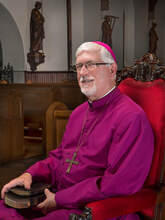 Bishop Matt Gunter Bishop Matt Gunter Gun Violence, Sin, and Regulation A Teaching for the Church The Rt. Rev. Matthew Gunter Bishop of Fond du Lac/Bishop Provisional of Eau Claire
Introduction Gun violence has become a public health issue in the United States unparalleled in any other democratic, industrialized nation. This is not just about politics; it is a moral issue. We are regular shocked, if no longer surprised by mass murders. Gun violence in our cities and elsewhere has become so common as to hardly make the news. Guns are now the leading cause of death for American children. They are common cause of fatal accidents in homes and a common means of suicide. Sadly, the list goes on and on. The Anglican Tradition has not been a pacifist tradition. It has allowed that, under certain circumstances, “It is lawful for Christian men [and women], at the commandment of the Magistrate, to wear weapons, and serve in the wars" (Articles of Religion XXXVII). This has been the majority position of most of the Christian Church generally for most of its history. But it is also the case, even with that, that there is in the Church’s teaching a deep ambivalence about the use of violence, the passions in the human heart that lead to violence, and the passions that violence enflames. Scripture The Church’s ambivalence about violence is rooted in the life and teaching of Jesus and the witness of the New Testament. The Birth Narratives that we remember every Christmas serve as a prologue and summary of the Gospel. In Luke 1:78-79, Zechariah prophesies of Jesus that he will “guide our feet into the way of peace.” When the angels appear to the shepherds proclaiming glad tidings of great joy at the coming of a savior, they sing of peace on earth as part of what salvation is about (Luke 2:14). At his death on the cross, Jesus prayed forgiveness for his killers and those who taunted him as he hung dying (Luke 23:34). Between the bookends of his birth and death, Jesus, in his words and actions, demonstrated a consistent pattern. There is the clear command in the Sermon on the Mount to not resist evil and to turn the other cheek (Matthew 5:39), to love our enemies (Matthew 5:43), and to perfectly show mercy to the evil and the good so that we might be children of our Father in heaven (Matthew 5:45-48). The warning against anger (Matthew 5:21-22) fits the pattern. Beyond the Sermon, Jesus expresses grief over Jerusalem for its refusal to pursue the way of peace (Luke 19:42). He declares that his peace is different from this world’s (John 14:27). He rebukes his disciples for desiring to exact retribution on the Samaritans who did not welcome him (Luke 9:55), a verse made even more telling in the King James Version in which Jesus adds, “Ye know not what manner of spirit ye are of.” He emphatically rebukes Peter for drawing a weapon to defend Jesus and perhaps himself (Matthew 26:52). And at the last, Jesus refuses to defend himself with the “twelve legions of angels” that were ready at hand for his defense (Matthew 26:53). From the beginning to the end and in-between Jesus demonstrates a consistent pattern of peacefulness and rejection of violence, certainly lethal violence, even in self-defense. Jesus calls his would-be disciples to deny themselves, take up the cross and follow him (Matthew 16:24) patterning our lives after his. He left us an example, so that we should follow in his steps (1 Peter 2:21) and “walk in love as he loved us and gave himself for us, a fragrant offering and sacrifice to God” (Ephesians 5:1). He calls them to be peacemakers (Mathew 5:9), sharing in his ministry of reconciliation (2 Corinthians 5:18). Following Jesus puts us at odds with the pattern of this world with its selfishness, violence, vengeance, and self/group-preservation. That is the pattern of the world to which we are warned not to conform in Romans 12:2. Romans 12 goes on to describe a community patterning its life on Jesus, including these echoes of Jesus, “Bless those who persecute you; bless and do not curse them” and, “Repay no one evil for evil, etc.” (Romans 12:17-21). This is a thread that runs through the New Testament, most explicitly in passages like 1 Thessalonians 5:15, 1 Peter 2:20-25, 1 Peter 3:9-12, Hebrews 12:14, and James 3:18. Tradition This witness of the New Testament, along with the assurance that Death had been defeated in the death and resurrection of Jesus, led the earliest Christians to embrace a commitment to nonviolence as the best way to “follow in his steps.” That attitude began to change some after the formal conversion of the Roman Empire. But only somewhat. There was a growing acceptance that government officials, including soldiers, might be authorized under specific conditions to use force and violence. But violence on a personal level was still considered sinful. St. Ambrose (340-397), Bishop of Milan, wrote, I do not think that a Christian, a just and a wise man, ought to save his own life by the death of another; just as when he meets with an armed robber he cannot return his blows, lest in defending his life he should stain his love toward his neighbor. The verdict on this is plain and clear in the books of the Gospel, “Put up thy sword, for everyone that taketh the sword shall perish with the sword.” (Matthew 26: 52). What robber is more hateful than the persecutor who came to kill Christ? But Christ would not be defended from the wounds of the persecutor, for He willed to heal all by His wounds. (On the Duties of the Clergy) St. Augustine (354-430), Bishop of Hippo, is the most influential theologian in Christian history. He allowed that violence can be exercised faithfully by those to whom authority to do so is delegated by the government on behalf of the community, i.e., the courts, police, and the military. But that was only true for the one to whom authority was delegated. He concludes that to kill without that authority can only be murder (The City of God, I.21). He also wrote, As to killing others in order to defend one's own life, I do not approve of this, unless one happens to be a soldier or public functionary acting, not for himself, but in defense of others or of the city in which he resides, if he acts according to the commission lawfully given him, and in the manner becoming his office. (Letter 47, To Publicola, sec. 5) St. Thomas Aquinas (1225-1274) was the most influential theologian of the Middle Ages. Going further than the witness of Jesus, he allows that using force in self-defense is permissible. But that should be done without the intent to kill. But as it is unlawful to take a man's life, except for the public authority acting for the common good, as stated above (Article 3), it is not lawful for a man to intend killing a man in self-defense, except for such as have public authority, who while intending to kill a man in self-defense, refer this to the public good, as in the case of a soldier fighting against the foe, and in the minister of the judge struggling with robbers, although even these sin if they be moved by private animosity. (cf. Summa Theologia, II-II, 64,7) The great Reformer, John Calvin’s teaching significantly influenced early Anglicanism. In his commentary on Matthew 26:52 and elsewhere, he defends the right of magistrates to wield the sword. He also allows that a civilian might use violence to protect his or her property. But he imposes this stringent caveat, And yet it is not the mere goodness of the cause that acquits the conscience from guilt, unless there be also pure affection. So then, in order that a man may properly and lawfully defend himself, he must first lay aside excessive wrath, and hatred, and desire of revenge, and all irregular sallies of passion, that nothing tempestuous may mingle with the defense. As this is of rare occurrence, or rather, as it scarcely ever happens, Christ properly reminds his people of the general rule, that they should entirely abstain from using the sword [and the gun]. (Commentary on Matthew 26:52) So, for Calvin, an ordinary person/civilian might, in theory, resort to violence. But in practice, given the almost impossible requirement of dispassion for it to be just and not murder, Christians desiring to follow Christ should “entirely abstain from using the sword [and the gun].” The Church discerned, given our broken and sinful humanity, that under certain prescribed and circumscribed circumstances, a degree of violence as a last resort might be necessary and therefore just. But that violence is reserved for those trained and authorized to exercise it under the law, with discipline and dispassion. We are grateful for their service. Even so, that use of violence is a concession to tragic human reality shaped by Sin and not something – for Christians, anyway – to bless, revel in, or glorify. And it is not something for individuals and civilians to take upon themselves. Sin & Unregulated Passions In referring to “irregular sallies of passion,” Calvin was following Jesus who warned against the passions of the heart that lead to sin (cf Mark 7:21-23). In the New Testament and the Christian tradition, sin is not just about breaking rules, it is rooted in unregulated passions that disturb our inner peace and prevent us from living the peace of Christ.. According to Titus 3:3, being “slaves to various passions and pleasures” means “passing our days in malice and envy, hated by men and hating one another.” And when Paul lists the works of the flesh that are opposed to the Spirit, along with “fornication, impurity, and licentiousness,” he also lists “idolatry, sorcery, enmities, strife, jealousy, anger, quarrels, dissensions, factions, envy, drunkenness, carousing, and things like these” (Galatians 5:19-21). In Matthew 5:21-22, Jesus particularly warned against indulging in the passion of anger which he said is related to murder. And so, self-control and regulating our passions is a recurrent theme in the New Testament and the early Church. It is rooted in Jesus’ declaration that self-denial is a basic requirement for being among his followers (Matt. 16:24, Mark 8:34, Luke 9:23). It is listed as a fruit of the Spirit (Gal. 5:23). The early Church continued recognizing the centrality of self-control to the Christian way. Christianity asserts that each human person is created in the image of God and therefore sacred, beautiful, beloved of God, and of infinite value. But we are also all caught in the interrelated web of Sin. Even the most committed and faithful of us continues, this side of the kingdom of God, to be susceptible to the radical, pervasive reality of sin and uncontrolled passions that draw us from the love of God and our neighbor. Our sinfulness infects us deep down in our hearts and distorts our imaginations. Thus, it infects even our best intentions. As Paul writes, “I find it to be a law that when I want to do what is good, evil lies close at hand” (Romans 7:21). This is true even for followers of Jesus. It is true even if we are as sure as we can be that our cause is just. Our hearts are still prone to selfishness, envy, greed, deceit (not least, self-deceit), anger, hatred, desire for revenge, and violence. Our hearts. My heart. Your heart. Not just the “bad” guys. Not just criminals. Not just the people we do not like. If we believe in sin at all, we believe it is radical, pervasive, and universal. There are no “good” guys. Even the best of us is prone to losing control and being a bad guy under stress and duress. We should therefore be distrustful of ourselves and our motives. And, as Calvin points out, we should distrust our ability to engage in violence righteously given our irregular sallies of passion. We are a society in which we all have been encouraged to give free reign to every passion. We are all rather undisciplined and given to unregulated sallies of passion. This is a set up for trouble. We should not be surprised by the unprecedented levels of gun violence in this country and the resulting heartache and grief. If we take sin seriously, not least our own sinfulness and the sinfulness of those who are like us, we should not be surprised that a society flooded with guns is drowning in violence. Christians, Weapons, and Regulation The Second Amendment of the Constitution asserts that, “the right of the people to keep and bear Arms, shall not be infringed.” Just what that means in the context of the whole of the amendment has been a subject of debate. In 2008, the Supreme Court settled some of that debate for the time being when it decided District of Columbia v. Heller, in which the court held for the first time that the Second Amendment protected an individual right to gun ownership. Specifically, it held that the amendment protected an individual right to keep a usable handgun at home. But that does not settle the question for Christians. The Constitution is a remarkable document that continues to guide the United States. But it is not inspired scripture. Christians must make a distinction between what is legal and what is faithful and moral. Regardless of particular laws allowing for it, it is hard to take Jesus, the Christian tradition, and the radical reality of sin seriously and to justify civilian disciples of Jesus owning weapons designed for war and the killing of human beings – created in the image of God. It is harder still to justify carrying such weapons in public where one might be tempted to give into sinful passions and fear and potentially kill someone. We ought not to put ourselves or others in the position of being tempted to murder intentionally or unintentionally. District of Columbia v. Heller did not rule out all regulating of firearms. According to those involved in writing the decision, Heller “merely established the constitutional baseline that the government may not disarm citizens in their homes.” They go on, The opinion expressly recognized “presumptively lawful” regulations such as “laws imposing conditions and qualifications on the commercial sale of arms,” as well as bans on carrying weapons in “sensitive places,” like schools, and it noted with approval the “historical tradition of prohibiting the carrying of ‘dangerous and unusual weapons.’” Heller also recognized the immense public interest in “prohibitions on the possession of firearms by felons and the mentally ill.” (John Bash and Kate Shaw, ‘We Clerked for Justices Scalia and Stevens. America Is Getting Heller Wrong.’, The New York Times, May 31, 2022) That leaves quite a bit of room for us as a society to pursue reasonable measures to address our epidemic of gun violence. Regulating guns is not the only thing necessary to address this epidemic. Addressing other issues like mental health, poverty, racism, and more effective policing are also necessary. We also need to re-evaluate our infatuation with the notion of “good” violence The community has a stake in finding ways to assure that our common life is safe and good for everyone. We are not just a collection of individuals insisting on our own rights without regard for how the accumulation of our choices effect the whole and shape the society in which we live. No individual freedom is absolute, including the freedom to own weapons. Because we recognize the reality of sin, we have various laws and regulations to govern our common life. There are reasonable, common sense gun safety measures which polls consistently show enjoy the support of gun owners and non-gun owners alike that do not compromise responsible civilian gun ownership. Gun violence has become a public health issue as well as a moral issue in the United States unparalleled in any other democratic, industrialized nation. Doing nothing to address that is irresponsible. As Jeremiah told those in exile in Babylon to “seek the welfare of the city where I have sent you into exile, and pray to the Lord on its behalf, for in its welfare you will find your welfare.” For the sake of the welfare of this nation and our souls, let us pray for the grace to regulate ourselves, let us be peacemakers following in the footsteps of Jesus, and let us urge our elected officials (magistrates) to make sure that guns are well regulated to better address our epidemic of violence.  Bishop Matt Gunter awarded the Bishop's Cross to Dr. Bradley Lauderdale and the Rev. Christopher Arnold. As a diocesan award, it was presented during the 2021 Convention of the Diocese of Fond du Lac on October 30th. The Bishop’s Cross is intended to honor individuals who have provided outstanding service to the Episcopal Church, especially on the diocesan and congregational levels. The Rt. Rev. Russell E. Jacobus established this award in 1997. Dr. Brad is a member of St. Thomas Episcopal Church, Menasha, Wisconsin. In his comments to the Convention, Bishop Matt noted his involvement in his parish and the diocese, especially in sharing his expertise as part of the diocesan Covid Task Force.
Fr. Chris is a priest canonically resident in the Episcopal Diocese of Fond du Lac. In his comments to the Convention, Bishop Matt noted his leadership to congregations with a focus in the prayerful life as well as to the diocese, especially in chairing the diocesan Covid Task Force. You may read the Bishop's comments here.  Bishop Matt Gunter has issued a Call to Prayer for the Episcopal dioceses of Wisconsin during the Inauguration week. Episcopalians are encouraged to offer prayers daily using the prayers found on pages 820-824 in the Book of Common Prayer. These prayers include prayers for the President of the United States and all in Civil Authority, for Congress or a State Legislature, for Courts of Justice, for Sound Government, for Social Justice and In Times of Conflict. The call document also includes a prayer from the Anglican Fellowship of Prayer for Government Transition. The call includes an announcement of an overnight prayer vigil held in the Cathedral of each Wisconsin diocese. From 8:00 p.m. Tuesday, January 19 to 12:00 Noon Wednesday, January 20. There will be a livestream the entire time, with prayers offered each hour on the hour from Christ Church Cathedral (Diocese of Eau Claire, episcopaldioceseofeauclaire.com), St. Paul’s Cathedral (Diocese of Fond du Lac, diofdl.org) and All Saints’ Cathedral (Diocese Milwaukee, diomil.org).  Bishop Gunter has been eighth Bishop of the Diocese of Fond du Lac since 2014. He was elected to serve as Bishop Provisional for the Diocese of Eau Claire the end of 2020 and is also currently serving the Standing Committee of the Diocese of Milwaukee as its Visiting Bishop. He notes that "in these distressing times, it is fitting for Christians to lift our voices together to God. It is also fitting for us to engage in ways small and large as we seek to bear witness to the way of Jesus which is the way of love and to play our part in the healing and restoration of what is broken." Download the Call and Prayers here.  Bishop Matt Gunter joins other bishops of the Episcopal Church in issuing a letter encouraging the People of God to stay away from protests and counter-protests that may happen up to the inauguration of President-elect Biden. The letter acknowledges "public demonstrations carry significant risk of both violence and exposure to COVID-19" and "we can best follow our vocation to be peacemakers by staying away from places where harm could come to God’s people." The call may be to stay home from protests, but as the bishops note, "staying home does not, however, mean staying silent." A number of avenues in "raising our voices to support our country’s democracy," are provided. The Episcopal Public Policy Network provides opportunities to advocate for peace, justice and the dignity of every human being. You join the network here. "Most of all," the bishops conclude, "in the coming days, we ask you to pray. This collect from the Book of Common Prayer holds particular meaning as we seek to face the days ahead with courage, wisdom, and grace: Grant, O God, that your holy and life-giving Spirit may so move every human heart, and especially the hearts of the people of this land, that barriers which divide us may crumble, suspicions disappear, and hatreds cease; that our divisions being healed, we may live in justice and peace; through Jesus Christ our Lord. Amen. The complete letter may be downloaded here or read below. 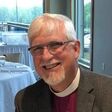 Bishop Matt Gunter is calling the people of the Diocese of Fond du Lac to pray for the election taking place November 3rd. A Season of Prayer resource offers a new prayer each day starting October 9th. To download this resource, as well as other voter education resources for people of faith, visit Forward Movement.org and search Season of Prayer. 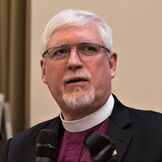 Dear brothers and sisters in the Diocese of Fond du Lac, The shooting this past Sunday of Jacob Blake in Kenosha places violence, racism, policing, protesting, rioting, and looting in front of us again. There is a lot we do not know, and we expect there will be a full and just enquiry into it all. But any shooting is tragic. And given what we have seen in recent months a black man being shot in the back is disturbing. It is also disturbing that out-of-state armed vigilantes were allowed to wander the streets after curfew, leading to the killing of two people and the wounding of another. That the shooter was white and able to walk away without interference from the police is troubling. We know that police work can be dangerous. And most police officers intend good. Still, there are policies for the legitimate use of potentially lethal force. When we see repeated examples of excessive use of force, disproportionately toward people of color, we sense that something must change. We can appreciate and support the work that police officers do while also seeking reform for better policing practices. Our African-American brothers and sisters report a pattern of violence and mistreatment by too many police officers. This causes grief, anger, outrage, and fear. We can disapprove of rioting, violence, and looting while also supporting legitimate protest against mistreatment. Sadly, the stories of their own experiences of mistreatment are not hard to come by from people of color. For the sake of truth and love, we need to listen to their stories. There has been progress in race relations in our society, yet racism remains pervasive. Our diocesan Mosaic Task Force continues to work to help us listen, learn, and better understand the persistence of racism. We must reflect with rigorous honesty upon our own racial prejudices – as we do with every sinful tendency. Whatever else we know about Mr. Blake, he is a child of God, beloved by Jesus. As Christians we are called to love him. We pray for him. Whatever else we know about Officer Sheskey, he is a child of God, beloved by Jesus. As Christians we are called to love him. We pray for him. As disciples of Jesus, we are called to pray and to love. We are called to be people of the truth – even when it is inconvenient. We are called to care and to seek justice – especially for the people society does not seem to care about. I call on us to commit ourselves to being such a people. Pray for peace; pray for justice.
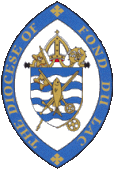 The Rt. Rev. Matthew Gunter, diocesan Bishop of the Episcopal Diocese of Fond du Lac, has been nominated by the Standing Committee of the Diocese of Eau Claire to become its Provisional Bishop, pending the election at the Diocese of Eau Claire’s diocesan convention in November 2020. He is the only nominee following Eau Claire’s discussion with its four neighboring dioceses. The nomination was made with the assent of the Standing Committee and Executive Council of the Diocese of Fond du Lac and Bishop Gunter has accepted the nomination. The leadership of both dioceses have begun discussion of specific details for the continuation of Gunter as Bishop of Fond du Lac while serving as Provisional Bishop of Eau Claire. The arrangement of a diocesan Bishop serving as Provisional Bishop of a neighboring diocese is not unknown in the Episcopal Church. Planning will involve both dioceses to provide for a healthy balance for Bishop Gunter while serving the Episcopal needs of the Dioceses of Fond du Lac and Eau Claire. It is appropriate to acknowledge that over the past 50 years, the dioceses have engaged in conversation and action about shared ministry, including the possibility of junctioning in 2011. It is important to note that while Bishop Gunter will serve both dioceses concurrently, the nomination is made independent of such discussion. Rather, it is made following an intentional transition process developed by the Diocese of Eau Claire, anticipating the retirement of the Rt. Rev. William Jay Lambert, III in November. This does not preclude the possibility that such discussions may occur in the future, but it should be understood that each diocese will remain fully separate, yet continue to walk alongside one another in spreading the Gospel as we have for more than 90 years. “It is my hope and prayer,” Bishop Gunter shared, “that as a bishop of the Church, I am able to guide and lead each diocese in a way that will strengthen the mission and ministry of the Church in living out the Good News. How each diocese does this will be different, but the goal of spreading the Gospel is the same.” Additional details will be communicated as they are determined. 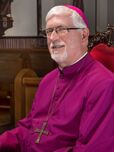 It was March 16, 2020 in response to the directives from the CDC and governmental agencies that Bishop Matthew Gunter suspended in-person public worship in the Diocese of Fond du Lac. Today, together with the diocesan Covid Task Force, he has released Celebrating Eucharist During the Covid Pandemic to provide direction during the current pandemic situation. The document provides direction by which the Eucharist may be celebrated in a congregation. Offering the Eucharist in this fashion is optional. "The intent is to allow for the Eucharist, with a small community gathering in-person to represent the congregation as a whole" Bishop Gunter commented. "It is not a return to our regular worship, but the Church providing the opportunity to have Eucharist given our current circumstance." Conditions for the Eucharist include only 3 or 4 persons present for the service who maintain social distance. The directions are within Wisconsin's Stay Safe at Home order and are at least as safe as going to the grocery store. It is expected that congregations who exercise this option may livestream or record it for online distribution. Those participating online may be using a form of spiritual communion in the Christian tradition: when one is unable — because of some unavoidable exigency — to participate in the Eucharist and/or to physically receive the Sacrament. St Thomas Aquinas once defined Spiritual Communion as “an ardent desire to receive Jesus in the Most Holy Sacrament and in lovingly embracing him as if we had actually received him.” St Teresa of Avila wrote: “When you do not receive communion and you do not attend Mass, you can make a spiritual communion, which is a most beneficial practice; by it the love of God will be greatly impressed on you.” St Jean Vianney, the Curé d’Ars, wrote “A spiritual communion acts on the soul as blowing does on a cinder-covered fire which was about to go out. Whenever you feel your love of God growing cold, quickly make a spiritual communion.” "We know God is present in the Sacrament. These directions allow the people of Fond du Lac to worship in a different way, but one recognizing the presence of the Holy Spirit in the world." Bishop Matt added. "This is not what we are used to, and it may be comfortable. However, we know the sacrifice and offering of the Eucharist, and with it “ourselves, our souls, and bodies” to God by the Church, even in a small assembly, is a spiritual good in itself." 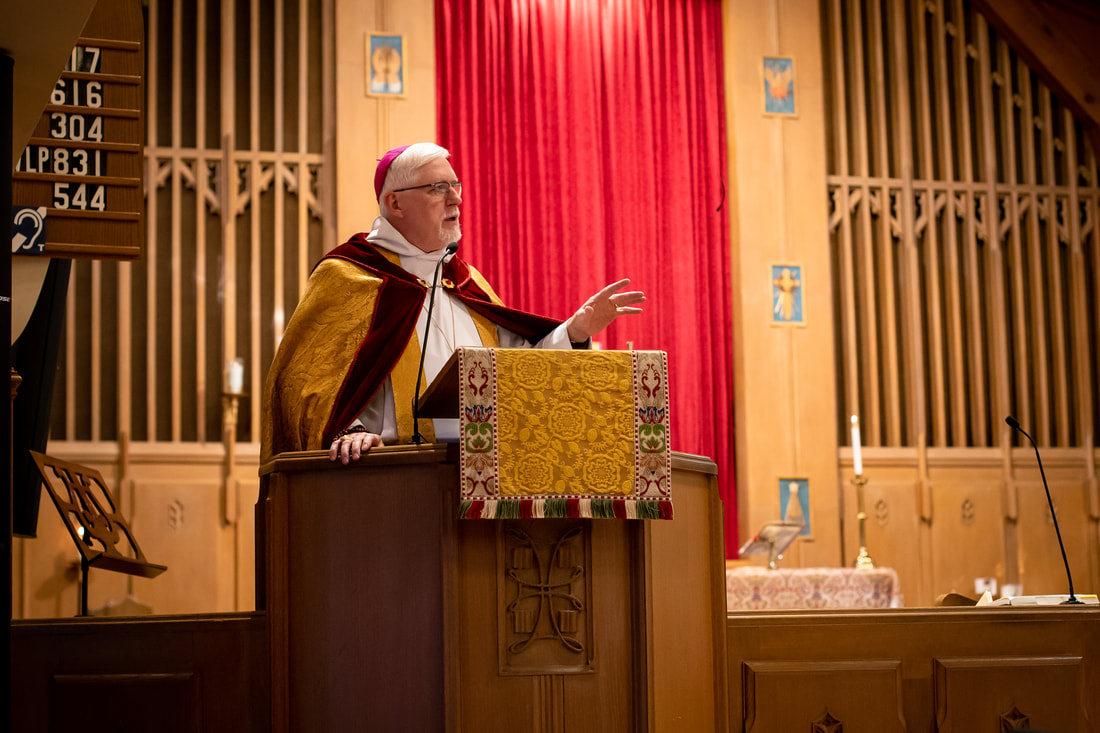 Zack Whitford Photo Zack Whitford Photo Read Bishop Matt Gunter's Pastoral Address to the Diocesan Convention assembled in Appleton, Wisconsin on Friday, October 25, 2019. “Lightning on the horizon.” That’s what the man said. In 2005 I traveled to the Diocese of Renk of the Episcopal Church in South Sudan leading a delegation from the Diocese of Chicago. We had a companion relationship like the we have with the Diocese of Masvingo. There, we heard a story told by one of the pastors. During the civil war, this pastor was talking to a man who was not a Christian. When the man learned that the pastor belonged to the Episcopal Church, he said, “I know your church. Your church is like lightning on the horizon in a time of drought signaling the promise of rain.” 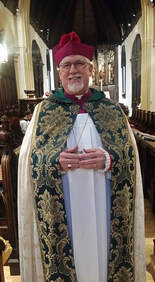 Bishop Matt at Nashotah House in 2016. Bishop Matt at Nashotah House in 2016. Bishop Matt Gunter will be the guest preacher at Nashotah House on Thursday, March 28, 2019. The Solemn Eucharist will be held in St. Mary Chapel on the Nashotah House campus at 4:30 p.m. Nashotah House was founded in 1842. It exists to form persons for ministry in the breadth of the Catholic Tradition, for the Episcopal Church, Churches in the Anglican Tradition, the wider Anglican Communion, and Ecumenical Partners, thus continuing to serve the historic role as “The Mission,” empowering the Church for the spread of the Gospel of Jesus Christ. Diocesan Postulant (a person approved to pursue ordination) Julia Hendrix is a seminarian at Nashotah House. 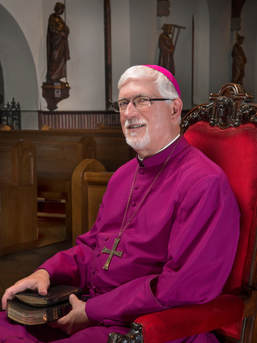 On Prayer Book Revision One question before General Convention this summer was whether it is time to revise our Book of Common Prayer. The bigger question was, if we revised it, how extensive or comprehensive should revision be? The answer coming out of convention was a cautious “yes” to a process for some revision, but “no” to comprehensive or substantive revision. Since there seems to be some confusion, I offer a few thoughts about what this means. Prayer book revision is not unusual. The Episcopal Church Book of Common Prayer, first ratified in 1789, has been revised may times – in 1892, 1928, and 1979. The 1892 and 1928 revisions were relatively minor. The 1979 revision was quite comprehensive and substantive. Each generation, it seems, takes a fresh look at whether the current version conveys the eternal truths of the gospel of Jesus Christ and enables the church to articulate its worship of the one, holy, and undivided Trinity, as clearly and fully as possible in contemporary language. The resolution passed at General Convention (A068 Plan for the Revision of the Book of Common Prayer) “memorialized” the current 1979 Book of Common Prayer which I take to mean that it is the standard prayer book going forward and we will not be replacing it soon. If at some point we produce a new prayer book, it will look and feel very much like the one we are using. Even so, there is need to find ways in our common worship to be more inclusive. That means avoiding using “man” and masculine pronouns when we are referring to people - men and women. Though many of us grew up with this literary convention, that understanding is increasingly not the case. For many, the language has become jarring and distracting to worship. What is theologically trickier is determining more “expansive” language for our common worship. That means finding ways to speak of and to God in language that does not always imply God is somehow “male”. “Father, Son, and Holy Spirit” is a fundamental Christian name for God we will continue to use, and we will not do away with all masculine language for God we have received from the Bible. But both the Bible and the Christian tradition provides a rich variety of names and images for God - some inanimate, some feminine. There are theologically responsible ways to incorporate some of these names and images to enrich our common worship. We have already experienced this inclusivity in recent years without revising the prayer book. General Convention authorized resources like Enriching Our Worship, containing inclusive and expansive Eucharistic liturgies, Morning Prayer and Evening Prayer. Some diocesan congregations have been using these liturgies on occasion. I share the sentiment of the first Bishop of Fond du Lac, John Henry Hobart Brown, who said this about revision of the Book of Common Prayer:
What General Convention proposed is neither a “stiff conservatism” nor radical revision leading to a “rude shock”. So with my approval, some of our diocesan congregations will be using some new liturgies over the next months and years as we enter into this process of discerning what kind of revisions are helpful. If yours is a congregation using these liturgies, your input about your experience will be a valuable contribution to the church’s discernment as we adapt our worship to the requirements of the present age.
Under the Mercy, The Rt. Rev. Matthew Gunter Bishop of Fond du Lac 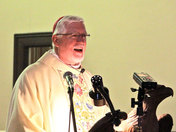 200 people gathered on Saturday, October 21, 2017 to celebrate the diocesan family of the Diocese of Fond du Lac. The 143rd Convention was held on the Oneida Reservation just outside of Green Bay. Wondering if “we aren’t being called to cast into the deep,” the Rt. Rev. Matthew Gunter established a focus during the Eucharist held at Church of the Holy Apostles, the oldest Episcopal congregation in the diocese and the State of Wisconsin. The day started with fellowship and a delightful continental breakfast provided at the Holy Apostles Parish Hall. Attendees then came together for worship in the stone church building, where they heard Bishop Matt preach about the challenges the Church faces today, and encouraging each of us to go deeper, so “we are more likely to experience the awesome, beautiful, goodness of God that transforms” as he reminded the congregation of the original diocesan motto [Duc] In Altum. Following a short drive from Holy Apostles to the Radisson Conference Center, the business of the day was hearing reports from a variety of ministries, electing those to serve on diocesan committees, discuss and adopt resolutions modifying the constitution and canons of the diocese, and approving the budget for 2018. The Seventh Sunday after Easter (May 13 in 2018) was designated as Companion Diocese Sunday. Last year’s convention established a relationship with the Diocese of Masvingo in Zimbabwe and Bishop Matt announced an invitation has been extended for its representatives to attend the 2018 Convention. Greetings were received from the Rev. Dr. Brad Hauff, who serves as the Episcopal Church Indigenous Missioner. Attendees browsed over a dozen display tables from diocesan ministries and vendors of liturgical vestments and maple syrup! Giving was encouraged to support the United Thank Offering and the Church Periodical Club. A deficit budget was approved, but with plans in place for funding the deficit. As one delegate noted in their evaluation “the convention was not what I expected. It was efficiently run, informative and helped me to see how my congregation fits into the work of the church at the diocesan level.” While the purpose of the day was taking care of business, the effect of the day was one that left many with the question “What will you do to go into the deep?” For more details of the convention, visit diofdl.org/convention.
The bishops of the Episcopal Church, who have been meeting in Alaska for the past week, have issued a 'Word to the Church' providing a summary of the meeting and what they learned. Bishop Matt Gunter posted his experience on his Facebook page with pictures and video. He also delivered gifts of a book and strawberry basket to the people of Beaver, Alaska by the people of Holy Apostles, Oneida. Read the full document and link to Stewardship of Creation resources at episcopalchurch.org.
 Bishop Gunter encourages you to donate to the Hurricane Harvey Response Fund of Episcopal Relief and Development to provide emergency assistance to people recovering from the impact of flooding after this major storm. Your generous support will supply critical necessities for communities immediately and for the long-term as they recover and rebuild. Give online here.
|
Categories
All
|
||||||||||||||


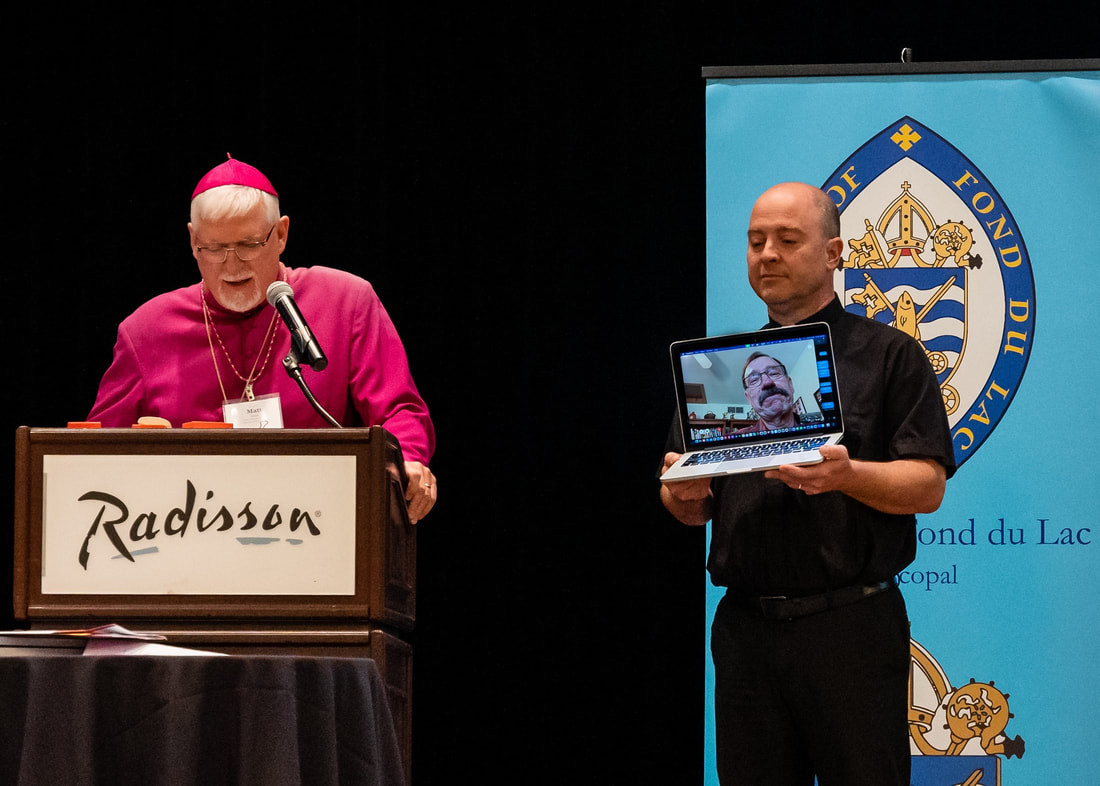

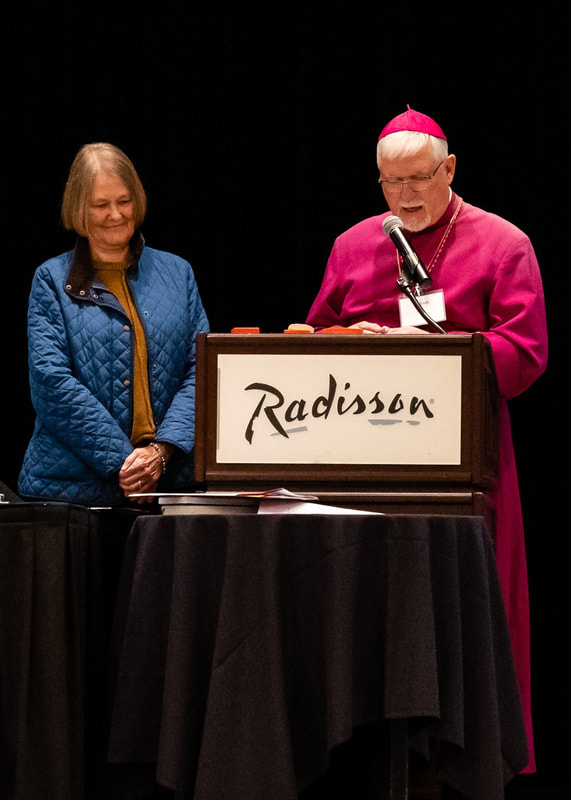
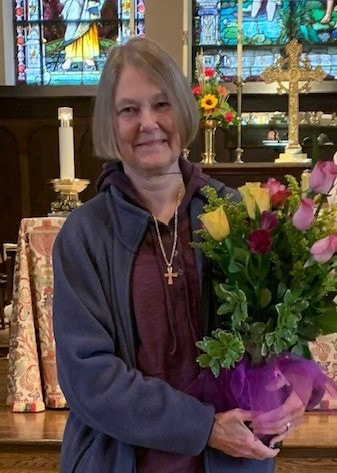
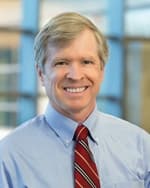
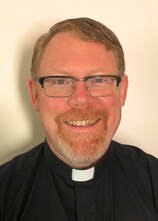
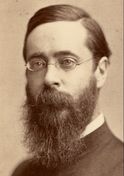
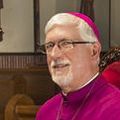
 RSS Feed
RSS Feed